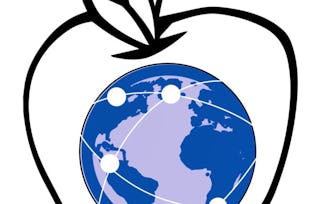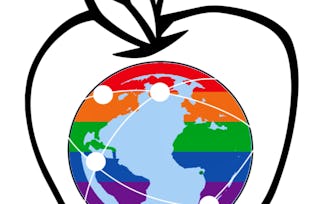In this course you’ll focus on how technology-enabled communication is changing geopolitics and, more broadly, how technology is connecting our world and changing lives. This will be done through a series of paired teaching sections, exploring a specific “Impact of Computing” in your typical day and the “Technologies and Computing Concepts” that enable that impact, all at a K12-appropriate level.

Teaching Impacts of Technology: Global Society
6 days left! Gain next-level skills with Coursera Plus for $199 (regularly $399). Save now.

Teaching Impacts of Technology: Global Society
This course is part of Teaching Impacts of Technology in K-12 Education Specialization

Instructor: Beth Simon
Included with
Skills you'll gain
Details to know

Add to your LinkedIn profile
8 assignments
See how employees at top companies are mastering in-demand skills

Build your subject-matter expertise
- Learn new concepts from industry experts
- Gain a foundational understanding of a subject or tool
- Develop job-relevant skills with hands-on projects
- Earn a shareable career certificate

There are 5 modules in this course
Welcome! Are you interested in teaching about the impacts of the technology you use everyday? To learn more about the computation and computing concepts that underlie those technologies? We'll be using a problem-based approach to explore interesting ways to teach concepts of networks and the internet, data and analysis, and even algorithms and data representation. Finally, we'll evaluate, critique and improve a TedED activity around the ethical choices facing designers of self-driving cars.
What's included
2 videos3 readings1 assignment1 discussion prompt
Have you ever thoughts of technology as a support or amplification of free speech? No need to get a news program or journalist to "get your story out there" when you can tweet! But not everyone on the planet has equal access to the internet or apps that enable people to share their viewpoints. We'll look at a range of technologies related (in some way!) to this including: VPN, cell phone batteries, and internet connectivity at the global scale.
What's included
6 videos9 readings2 assignments4 app items1 discussion prompt
How has technology made your life easier? One thing I love is that travel, including traveling outside of my home country has gotten a LOT easier -- just because I can use my smartphone to find information and directions when I am abroad! But there's other ways global, ubiquitous access to the internet and cheap computational devices is changing our lives. Super hot things right now are "the Internet of Things" -- and specifically self-driving cars. Let's learn more about them!
What's included
3 videos3 readings2 assignments3 app items1 discussion prompt
As our individual data generation and collection grows, so does the collective amount of data stored in the world. Controlling access and maintaining the privacy of our data -- especially as we use our myriad of devices in places far outside our own homes over wireless connections -- is critical. We'll also toss in here the concept of having a secure form of money -- bitcoin!
What's included
4 videos9 readings2 assignments7 app items1 discussion prompt
What's included
5 videos4 readings1 assignment1 app item
Earn a career certificate
Add this credential to your LinkedIn profile, resume, or CV. Share it on social media and in your performance review.
Instructor

Offered by
Explore more from Education

University of California San Diego

University of California San Diego

University of California San Diego

University of California San Diego
Why people choose Coursera for their career




Frequently asked questions
Yes! This course is designed as component of a Specialization that is 1 of a set of 4 Specializations (all will be offered on Coursera) that will support the requirements of the California Supplementary Authorization. Additionally, the Specialization may support credentialing or authorization in other states. However, most states require a transcript from an accredited institution of higher education. See the FAQ question on “Will I earn university credit” to find out how to get such a transcript.
Yes, you can earn UCSD credit for completing this course, but only by completing the full Teaching Impacts of Technology in K-12 Education Specialization. In addition, you will need to (1) Enroll in an additional UCSD Extension course before completing the capstone ($500) and (2), complete part of the capstone project via an online proctoring service. After this is done, your Specialization course grades will be accumulated and a transcript with your final grade (both letter grade or pass-only supported) will be issued from UCSD with 4 graduate-level units. These are eligible to count towards the California Supplementary Authorization.
There is no background knowledge, neither in education nor in Computer Science, required to take this course - just an interest in learning computational concepts about the technology that surrounds us and how to best teach those concepts to others.
Basic proficiency in the use of Googledocs will be needed to complete assignments within the course. Google help documentation will be provided, and with some extra attention, first time use of Googledocs should not be a barrier to successful completion of the course.
More questions
Financial aid available,





